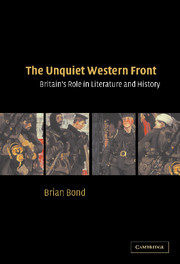Book contents
- Frontmatter
- Contents
- PREFACE AND ACKNOWLEDGEMENTS
- 1 THE NECESSARY WAR, 1914–1918
- 2 GOODBYE TO ALL THAT, 1919–1933
- 3 DONKEYS AND FLANDERS MUD THE WAR REDISCOVERED IN THE 1960S
- 4 THINKING THE UNTHINKABLE THE FIRST WORLD WAR AS HISTORY
- SIR LEES KNOWLES (1857–1928)
- THE LEES KNOWLES LECTURES
- NOTES
- SELECT BIBLIOGRAPHY
- INDEX
3 - DONKEYS AND FLANDERS MUD THE WAR REDISCOVERED IN THE 1960S
Published online by Cambridge University Press: 20 July 2009
- Frontmatter
- Contents
- PREFACE AND ACKNOWLEDGEMENTS
- 1 THE NECESSARY WAR, 1914–1918
- 2 GOODBYE TO ALL THAT, 1919–1933
- 3 DONKEYS AND FLANDERS MUD THE WAR REDISCOVERED IN THE 1960S
- 4 THINKING THE UNTHINKABLE THE FIRST WORLD WAR AS HISTORY
- SIR LEES KNOWLES (1857–1928)
- THE LEES KNOWLES LECTURES
- NOTES
- SELECT BIBLIOGRAPHY
- INDEX
Summary
My thesis in this chapter is that at the end of the twentieth century popular notions of the First World War in general, and Britain's role in particular, were largely shaped in the 1960s, in part reflecting the very different concerns and political issues of that turbulent decade, but in part resurrecting ‘anti-war’ beliefs of the 1930s.
At the risk of over-simplification and distortion, these are some of the main events that provide the context in which a new generation was introduced to the history of the First World War. There was, first and foremost, a pervasive fear of all-out nuclear war which is hard to imagine now. The Campaign for Nuclear Disarmament and its annual Aldermaston march reached a peak of popularity and media attention in the late 1950s and early 1960s. The Cuban missile crisis in 1962 provided hard evidence that the world had teetered on the brink of annihilation. National service was ended in 1960 so the last conscripts had left the armed forces by 1963. Thus ended a system of compulsory service, reintroduced in 1939, by which the majority of the male population – for good or ill – at the very least had some familiarity with the realities of military life. By the end of the decade this was ceasing to be so, and the gap has necessarily grown ever wider. Not that unfamiliarity with army life has entailed a diminishing interest in military history, in fact quite the contrary.
- Type
- Chapter
- Information
- The Unquiet Western FrontBritain's Role in Literature and History, pp. 51 - 74Publisher: Cambridge University PressPrint publication year: 2002



